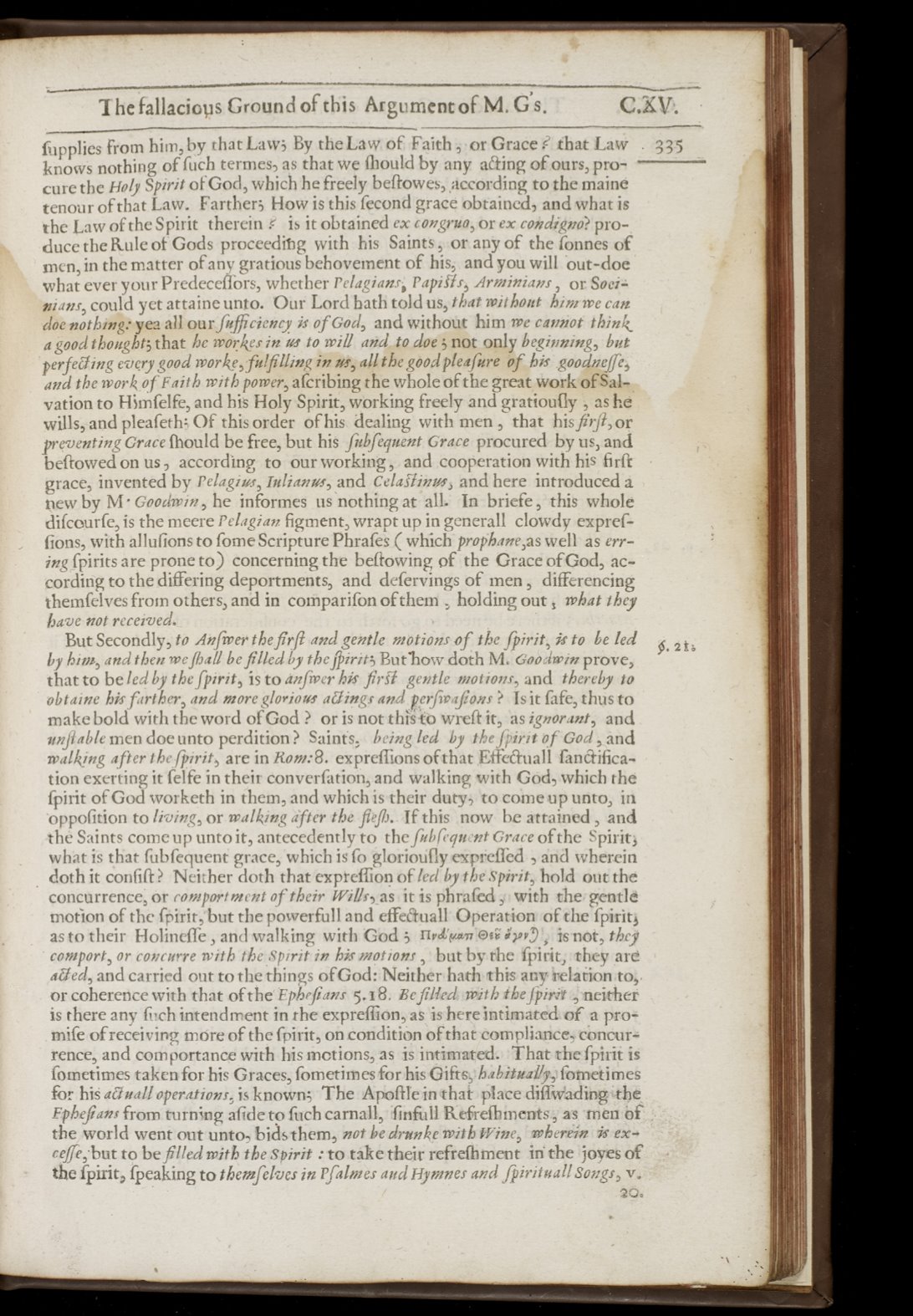

The
fallacious
Ground
of
this
Argumentof
M.
G's.
G.X
.
fupplies from him, by
that
Law;
By
the
Law.
of
Faith
,
or Grace
?
that
Law
.
335
knows nothing
of
fuch
termes,
as
that
we fhould
by
any
a&ing
of
ours,
pro-
cure the
Holy
Spirit
of
God,
which he freely beftowes,
according
to the
maine
tenour
of
that
Law.
Farther;
How
is
this fecond grace
obtained, and what
is
the
Law
of
the Spirit therein
? is
it obtained
ex congruo,
or
ex
condign?
pro
-,
duce the
F
ule
of
Gods proceeding with
his
Saints,
or
any
of
the
fonnes
of
men,
in
the
matter
of
any gratious
behovetnent
of
his,
and
you
will
out-doe
what ever your
Predeceffors,
whether Pelagian;
Papiffs,
Arminian,
or
Sod-
mans,
could yet
attain
unto.
Our
Lord bath told
us,
that
without him
we
can
doe
nothing:
yea
all
ourfuffeciency
is
of
God,
and without him
we
cannot
think
a
good
thought;
that
he worker
in
us to
will and
to doe
5
not
only
beginning,
but
perfelting
every good
worke,
fulfilling in to, all
the
goodpleafure
of
his
goodneffe,
and
the work
o
f
Faith with
power,
afcribing the whole
of
the
great,
work
of
Sal-,
vation
to
Himfelfe,
and
his
Holy Spirit, working freely
and
gratioufly
;
as
he
wills
and pleafeth;
Of
this
order
of
his
dealing with men
,
that
his
firf,
or
preventing
Grace
fhould be
free,
but
his fubfequent Grace
procured
by us,
and
beftowed
on
us
, according to our working
,
and cooperation with
his
firft
grace,
invented by
Pelagiva,
Iulianus,
and
cela3linus,
and here introduced
a
pew
by
M Goodwin,
he informes
usnothing
at
all.
In briefe
,
this
whole
difcourfe,
is
the
meere
Pelagian
figment,
wrapt up
in
generali
dowdy expref-
fions,
with
allufions
to
tomeScripture
Phrafes
(
which
prophane,as
well
as
err-
ing
fpirits
are prone
to)
concerning
the
beftowing
of
the
Grace
of
God, ac-
cording
to the
differing
deportments, and
defervings
of
men
,
differencing
themfelvesfrom
others, and
in comparifon
of
them , holding
out
;
what
they
have not received.
But Secondly,
to Anfwer
the
firfl and
gentle motions
of
the
fpirit,
it
to
be
led
4
i
to
by
hint, and then
we
fhall
be
filled
by
thefirit;
But'how
doth
M.
Goodwin
prove,
that to
be
led
by
the
fpirit,
is
to
ánfwer his
firfl
gentle motions,
and
thereby to
obtain
his
farther,
and
moreglorious
allings and
perfwafions
?
Is
it
fafe,
thus to
make bold with the word
of
God
?
or
is
notthì`'sto wreft:it,
as ignorant,
and
unfiable
men doe
unto perdition
?
Saints,
being
led
by
the
fpirit of
God
,
and
walking
after
the
fpirit, are
in Rom:8. expreffions
ofthat
Effeetuall fan
&ifica
-
tion exerting it
felfe in
their
converfation, and walking with God,
which
the
fpirit
of
God worketh
in
them, and
which
is
their
duty, to
come up unto, in
oppolition
to
living,
or
walking
after
the
fiefh..If
this now
be
attained,
and
the
Saints come up
unto
it,
antecedently
to
the
fubb/i'quew
Grace
of
the Spirit,
what
is
that
fubfequent grace,
which
is fo
glorioufly expreffed
,
and wherein
doth
it
confft? Neither doth that
exprefiion
of
led
by
the Spirit,
hold
out the
concurrence,
or
comportment
of
their
Wills,_as
it
is
phrafed,
with the,
gentle
motion
of
the fpirit,`but
the
powerfull and
effe&uall
Operation
of
the
fpirits
as
to
their Holineffe,
and
walking with God
5
nr
4,',<a
i
is
not,
they
comport, or concurre
with
the
Spirit in
his motions
but
by the
fpirit, they
are
ailed,
and
carried out to
the
things
of
God: Neither bath this
any
relation
to,.
or
coherence with
that
of
the
Eph?jians
5.18.
Be
filled
with
the
fpirit
,
neither
is
there
any
filch
intendment
in
the
expreffion,
as
is
hereintimated
of
a
pro-
mile
ofreceiving more
of
the fpirit,
on
condition
of
that
compliance, concur-
rence, and comportance with
his
motions,
as
is
intimated.
That
the
fpirit
is
fometimes
taken
for
his
Graces, fometimes
for
his
Gifts,
habitually, fometimes
for
his ahinail operations,
is
known;
The
Apoftie
in
that
place
difhwáding
the
Fphefians
from
turning
afideto
filch
carnall,
finfull
Reírefhincnts,
as
men
of
the world went out
unto,
bids
them,
not
be
drunke with
Wine, wherein
is
ex-
ceffebut to befilled
with the
spirit
:
to
take their
refrefhment in
the
joyes
of
the
fpirit,
(peaking
to
themfelves
in
Pfalmes
and
Hymnes
and
fpirituall
Songs,
v.
aoo










